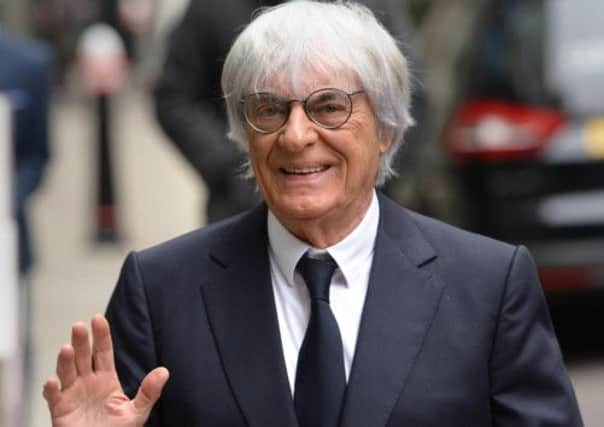Bernie Ecclestone denies ‘corrupt deal’


Ecclestone has been accused of entering into a “corrupt agreement” with a banker to facilitate the sale of the Formula One Group to a buyer “chosen” by him.
A German media company said it lost out as a result of the deal and has taken legal action against Ecclestone, chief executive of the F1 Group.
Advertisement
Hide AdAdvertisement
Hide AdEcclestone says Constantin Medien’s claim “lacks any merit” and he denies any “conspiracy”.
He told a judge that he had paid Gerhard Gribkowsky – who was a senior official at a German bank – £10 million.
But he said he made the payment because Gribkowsky insinuated that he would create difficulties with tax authorities.
“I made the payment to Dr Gribkowsky because he said he would shake me down concerning tax arrangements with our family trust, which would have been very expensive,” Ecclestone told Mr Justice Newey. “It was £10m, as it happens.”
Ecclestone denied giving a different version of events to journalists or changing his story and added: “Most of these journalists, as you know, really should be closely working with Jeffrey Archer.”
Philip Marshall QC, for Constantin, suggested that there was “no way” Ecclestone had perceived Gribkowsky as a “threat”.
“I am not sure whether it was or whether it wasn’t,” said Ecclestone. “I was not prepared to take the risk.”
Mr Marshall had outlined allegations against Ecclestone at the start of the trial on 29 October.
Advertisement
Hide AdAdvertisement
Hide AdHe said Gribkowsky “assisted” the F1 boss to facilitate the sale of the F1 Group to a “purchaser chosen by Mr Ecclestone”.
Mr Marshall suggested that “corrupt payments” resulted in a sale of the bank’s investment in a group of companies which owned “lucrative commercial rights” associated with F1. He said payments totalling about £27m were made to Gribkowsky – who had been a “senior ranking official” at the bank – at the instigation of Ecclestone.
Mr Marshall said a “corrupt arrangement” was entered into between Ecclestone and Gribkowsky in 2005.
He said Ecclestone benefited financially and the deal allowed him to retain a “position with F1 going forward”.
There had been a “real risk” of Ecclestone’s removal from his position in the F1 Group, he added.
Mr Marshall said the German bank sold its holding in the F1 Group to a private equity group called CVC. He added that Ecclestone thought CVC would support his “continuing role as chief executive” of operating companies.
Mr Marshall said Constantin Medien had investment rights in the F1 Group and was entitled to the proceeds of any sale.
He said the bank’s investment was sold “without the normal and proper process” and the media company lost out.
Advertisement
Hide AdAdvertisement
Hide AdMr Marshall said Gribkowsky was given a jail term of more than eight years after being convicted of corruption at a trial in Munich last year.
Lawyers representing Ecclestone have outlined their case to the judge in written arguments.
“This claim lacks any merit,” said Robert Miles QC. “In short, this is an artificial, manufactured complaint.”
He added: “The claim fails on each of its elements: there was no conspiracy, there was no intent to injure Constantin… Constantin has suffered no loss.”
Mr Miles said in 2006 it had been arranged that Gribkowsky would be given a “consultancy package” and Ecclestone received “tax threats”.
He added: “It was arranged that Dr Gribkowsky would be given a pay off by way of consultancy package as he was requesting. Mr Ecclestone agreed to a pay off because of the tax threats and insinuations which he had received from Dr Gribkowsky.”
The trial at the High Court in London is expected to last several weeks.